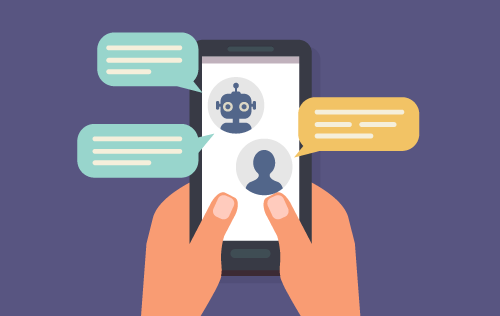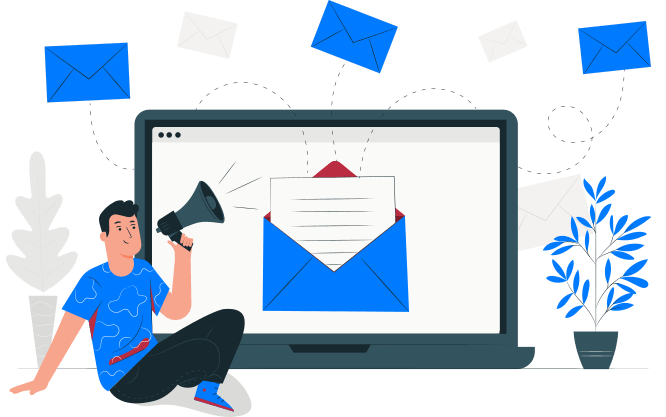
Build a chatbot with full stack Web development
What is a Chatbot?
With growing dependence on the digital market, web developers came up with a way for the users to converse and search for what they are looking for. That is the chatbot- a program with artificial intelligence feature that converses with the user just like a human. It answers to the user through voice commands or text and gives a solution to your questions. The purpose of a chatbot is automation. They help in scaling and supports business tailor their customer service. Chatbots make 24*7 support a reality. But even AI-based chatbots are not up to the level of human interaction when faced with complex questions. 
How does a chatbot work?
A chatbot simulates human conversation and parallels can be drawn with instant messaging. The chatbots are replacing humans and independently operate within messaging services. The chatbots use scripts and machine learning to respond to questions. As of now, a chatbot is used with a human customer service executive as its back up. If it comes across a question that is not available in its knowledge base it will pass it on the human. It will feed this learning and grow as time goes by.
A chatbot has multiple layers, namely, the APIs, the databases and an app layer. This is similar to full stack Web development. But, the bot is just a machine. How does it understand us humans and answer our questions? The answer lies is that it doesn't. What it has a database of known questions and its answers. It adds to this knowledge base by storing the transcripts of all conversations held by the chatbot.
The developers use these transcripts to match up with the best answers. APIs are used to train these bots to churn out the best answer. The chatbots are connected to the databases and Natural Language Processing is used to convert queries into information. This information is used to search for the appropriate answer. To learn and improve your full stack development skills, take a certified course. Specialized online training courses on Full stack development with projects are available. Get experience and an online portfolio as well. Sometimes people prefer personalized trainers to teach the course and that can be fulfilled by Full Stack offline courses.
Why do we use chatbots? What are the benefits?
Accessibility Every organization, big or small use chatbots to promote user interaction. Placed on every page of the website, the user has instant access to service. These organizations tailor there chatbots to suit their needs. Primarily focused on user experience, chatbots are also available to book tickets and shop. Thus the organization makes as well as saves bucket loads of money using the chatbot.
Customer satisfaction Customer satisfaction is a key benefit of using a chatbot. Humans are unpredictable but bots don't care either way. They do the work they are programmed for and they don't take offence or tire. This means that irrespective of how polite or rude or abusive a user customer is, the chatbot will give polite answers. It also tailors results according to our preferences which makes the customer satisfaction rating shoot up.
Medium of Sales When chatbots are used to help user book tickets or sell something, it also becomes your sales representative. The chatbot can sell your product all day long, and all night long. With a flourishing eCommerce industry, online shopping is in vogue and your chatbot might just be the thing to boost the sales. The chatbots are also designed to act as your PA. It can be your personal shopper and give style and clothing recommendation. It can help you pick a destination for your trip and book tickets. While selling, it also stores your preferences and tailors their responses to your preferences. In this regards, they operate just like a human sales representative.
Cost-effective Various researches say that chatting is the most preferable method of user interaction. With the growing dependency on life on the internet, the chat volume is humongous. A human is only capable of holding one or two conversations at one time. They will also take some time to frame their answers. But a chatbot makes this easier by throwing out ready results and can have hundreds, even thousands of conversation at the same time. This increases revenue and cuts down employee-related expenditures.
Automation Repetitive jobs are hell on humans. Our productivity dives off a cliff if we do the same set of work over and over again, all day long. The chatbots were introduced to negate this effect. Chatbots do not tire of repetition neither do they need breaks. Human employees can spend their time more efficiently and be more productive.
Faster Handling There is no on-boarding time as such allocated for bots, unlike humans. Employee turnover is fairly common and organizations need to train their replacements. A lot of time, effort and money are saved by eliminating human elements. New human trainees have to be taught the work and the training takes time. They also need some time to assimilate into the work environment. All these hassles can be overcome by using chatbots.
Cons of using chatbots How much ever perfect chatbots appear, there are some disadvantages that you need to consider. .png)
They are not human and they cannot improvise. They are bound by the programmed rules and can't separate humour and sarcasm from genuine questioning. If it comes across something new, it will try to deflect and run around in circles causing frustration to the user.
A limited set of responses elicited. The response is tailored from its knowledge database. There are always new cases and are limited in their responses despite fast service.
Not a universal solution Chatbots are not useful or successful across the fields. A bot may not be a practical solution for very complex businesses.
No decision making For all its brilliance, a chatbot is a robot application and cannot make decisions on its own. They are used to throw out the most relevant and keyword matching solution to the user.
Expensive Bots can be simple or complex. The more complex the requirement, the higher the installation cost. It also has a period of learning and this is initiated by humans which will take time. So, investing in a chatbot might not be a sound decision.
Opportunity identification While building a chatbot-AI based, the designer should think about and identify opportunities where AI can be used to better automate work.AI solutions are based on work complexity and data complexity. Messaging interface selection will shortlist probables.Who are the users? How’s the accessibility? Which messaging platform you are focusing? The devices that will be used for chatting?
-
- Facebook messenger, Viber- mobile usage, access a lot of users.
- WeChat- focus on Asians
- Slack- focus startups and developers.
- Skype- focus on corporate usage

Goals of building a chatbot
Understand why the organization wants a chatbot. What is the expected work of the bot? When the designers know what is the purpose of the chatbot, they can develop it with the right design.
Design conversation flows Decide if you require a structured or unstructured model. One includes the logical flow of conversation while the other is freestyle texting. The developers will interpret the user answers to develop conversations. Then the scripting for the same is done.
Coding or non-coding platforms Non-coding development platforms are easy to use and faster. But they are not very customizable.
Coding method: Now that design aspect is complete, you need to think about the languages, frameworks, databases and other Full stack web development tools and select and/or in some cases, create your own stack. To go for the right stack you need to take into consideration the design, the viability of the business, the feasibility of the technology.
Some of the popular stacks are: API.ai- developed by Google, this builds an AI-powered robust user interface. It is a natural language understanding platform and is easy to use. This is now rebranded as Diagflow. It uses node.js and npm package manager. Dashbot- uses Node.js, react.js, AWS lambda among others. An analytics platform, help improve user experience and increase engagement. Botpress- An open source bot development tool that uses typescript. Runs on javascript. Uses Node.js, SQLite and PostgreSQL.
The front end has React or BootStrap and also uses Lodash and other libraries. It is cross-platform and small in size. Airtable-This is a database with an easy to use API. It integrates with react and bootstrap to develop easy and fast bots.
Develop Once you have selected the stack and made sure that you meet the technical requirements of being the right full-stack developer, you can go ahead and finish developing the project. If you have anu learning requirements, you can consult the Full stack development roadmap and plan to learn the required technologies.
Scale Start the bot small and then scale it to the required size. This can again be customized easily as required at a later stage.
Best practices for building a chatbot:
- Know your customer
- Use emotions to connect with users
- Welcome user to converse
- Be a guide
- Reduce confusion
- Get ideas and suggestion to improve the user experience.

Accelerate Your Career with Crampete




